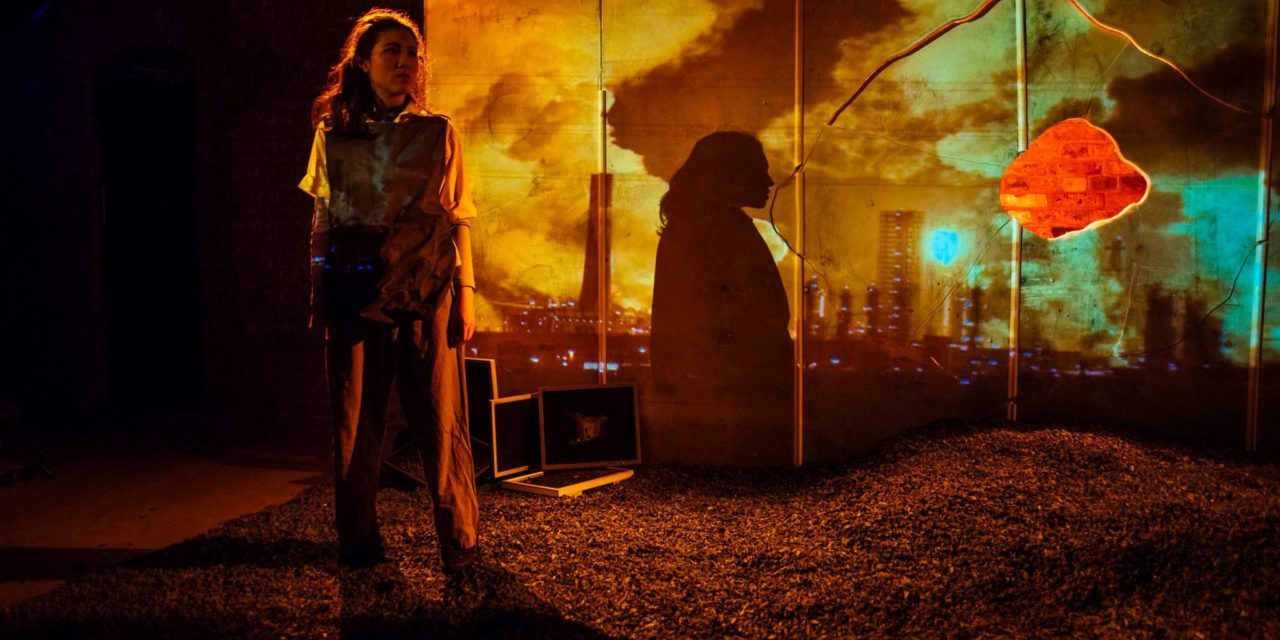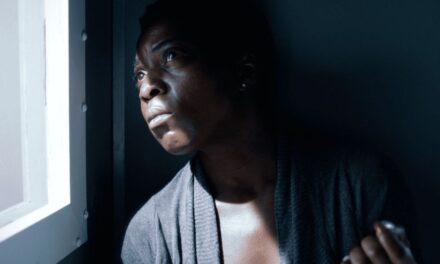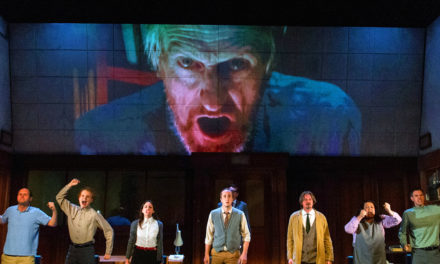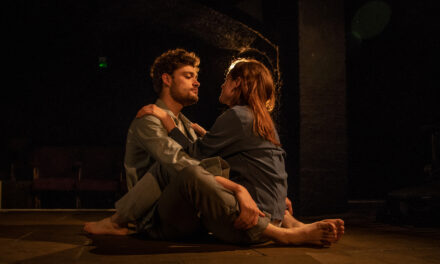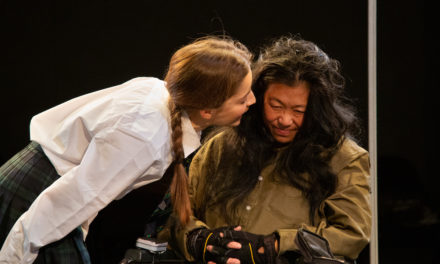Currently performing with the Royal Shakespeare Company, Lucy Phelps is an actor and translator whose début theatre translation, The Pulverised by Franco-Romanian writer Alexandra Badea, premiered in May 2017 at London’s Arcola Theatre, before opening at York Theatre Royal in June. In this article, she describes her own journey from acting into translation, and from page back to stage, and shares her reflections on the role of the translator in theatre.
I caught the translation bug back in 2008. Wait, I lie. I can actually trace some early symptoms back to the year 2000 when, on a childhood trip to Madame Tussaud’s at the tender age of 12, I insisted on purchasing both the French and English guidebooks in order to be able to compare the two.
However, it was an ‘Advanced Translation’ module in the 4th year of my French and Spanish degree, that ultimately made me incurable. After a term of weekly assignments working with newspaper articles and information based pieces, we were set the task of translating a short passage of fiction over the Christmas holidays. I spent the best part of my 2008 roast turkey mulling over all the choices I could make for each word, every phrase. I just couldn’t think of anything else. I was hooked.
My principal fascination rests in the idea that some words in other languages can be untranslatable in a single English word. Itsuarpok in Inuit roughly translates into English as “the feeling of anticipation when you’re expecting someone, that leads you to constantly check to see if they are coming” – which you might very well do if you lived in a remote part of Greenland. Sobremesa in Castilian Spanish can be best described as, “the time spent after dinner socializing with the people you spent the meal with.” I guess for so many years we Brits had to run to catch the last tube home there was little time for post-dinner charlas. If Salut means ”hello” why do the French also use it to say “goodbye?” What this all communicates about behavior and customs particular to individual cultures leads you down an endlessly fascinating road of discovery.
So fast-forward 5 years from my festive assignment – add in a postgraduate acting degree from the London Academy of Music and Dramatic Art (LAMDA), and a few professional acting gigs under my belt – and during one of my “resting periods” I decided to try my hand at play translation.
I hadn’t previously felt drawn towards playwriting per se, but fortunately, I don’t have to invent the story nor carve the dramaturgy, that has already been done. A play translator’s job, as I see it, is to produce an “actable,” compelling English language version of a foreign play script that captures the essence and spirit of the original piece and remains faithful to the intention of the original writer. I am the vessel through which they can transmit their work to a wider audience. As an actor with an arsenal of French and Spanish language skills and cultural knowledge, I was confident I could give it a good go, at the very least.
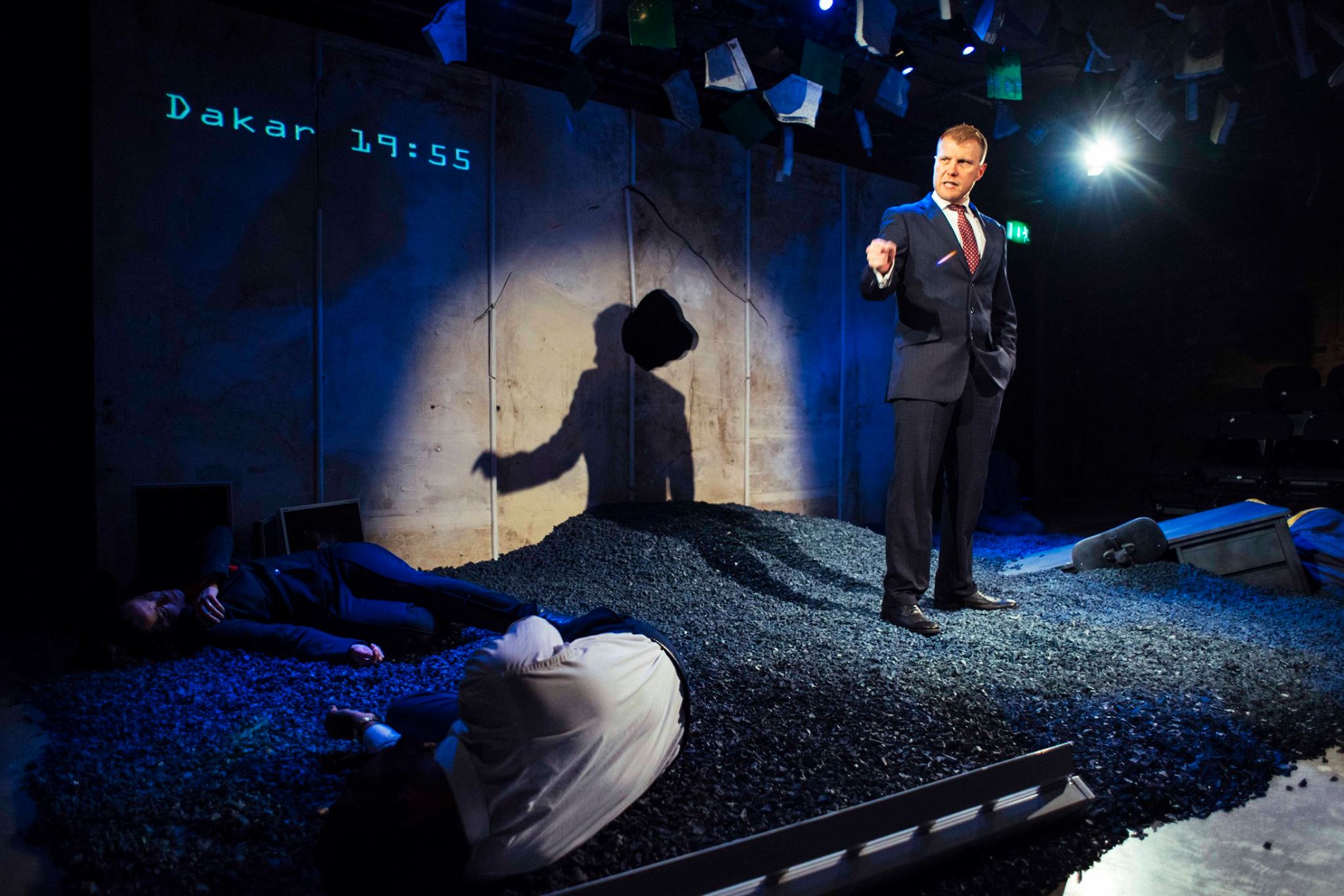
Richard Corgan in The Pulverised at the Arcola Theatre, May 2017
Pulverisés is a play originally written in French by Alexandra Badea. It won the Grand Prix de la Littérature Dramatique in 2013 and was presented to me the following year by director Andy Sava. It tells the story of 4 individuals working for the same multinational company in 4 different corners of the globe. Through a series of interspersed monologues, the play presents the damaging effects the globalized workplace can have on our emotional lives.
Andy and Alex are both women originally from Romania yet work in a second language. Negotiating the cultural and linguistic hurdles involved in moving from one tongue to another is a daily practice for them, so they were brilliant allies in the process of developing Pulverisés into The Pulverised.
The greatest challenge with Pulverisés was not the cultural transposition of its subject matter – it is a universal story – but rather its form. First, the French text is extraordinarily poetic and it was my job to ensure Alex’s poetry crossed the channel. So I set about devising my own exercise to help me with this: I spent an afternoon lying on my bedroom floor listening to a radio recording of the French text, one monologue at a time and made notes.
How did the monologue make me feel when I listened to it? What did I feel by the end of it? Were there any particular sounds that stood out? Could I hear any rhymes or rhythms? I then read my corresponding English translation of each monologue out loud immediately afterward to see how the two corresponded and where I needed to better honor the style of the original text in my version.
I also choose to have an open dialogue throughout the process with the writer, Alexandra Badea, who, fortunately for me, has a strong command of English. We were able to discuss areas where she felt the poetry was lacking in my translation and debate possible interpretations.
Another challenge is that the monologues are all written in the second person singular, employing the informal tu/you form.
Extract from The Pulverised
You open your eyes
Your eyelids feel heavy
Your body slides over the sheet
Your thigh cramps
Your triceps twitch
Your mouth is dry
You open your eyes and close them again
Sensory overload
This doesn’t smell like your bed
Nothing here is yours
Not the matches not the plastic bottles of whisky not the cotton buds
Not the disposable slippers or the shoe polish
You’re pulverised by this space
This isn’t the first theatrical piece to employ such a device, but it wasn’t something I had much experience with. Should I keep it? Should I change it to “I?” Why does Alex employ this device?
I quickly realized that it was essential to retain this in the English translation: having characters address themselves as “you” gives the text a strange, destabilizing, detached, observational effect that the subjective “I” doesn’t quite achieve. All of these characters are becoming increasingly disconnected from their emotions; they’re disengaged, watching their life rather than living it. We see all – bar one – of them care less and less about the consequences of their actions. However, I wanted to test it in English to be sure.
I had the luxury of being able to workshop the translation with 4 professional actors a few months before the final draft was due. Addressing the tu issue was high on both Andy’s and my agenda.
One exercise we tried involved asking the other three actors in the room to speak the monologue of the fourth actor on their behalf, and also remain on stage with them. “You do this… You do that.” However this felt too much like they were outsiders looking in, commenting on the character rather than being a part of the character’s conscience. I believe Alex’s aim in using the tu form was to achieve something much more disconcerting – these individuals have lost their sense of self. They’ve lost their Je/I. With this in mind, hearing the actors using you to address themselves seemed like the right choice.
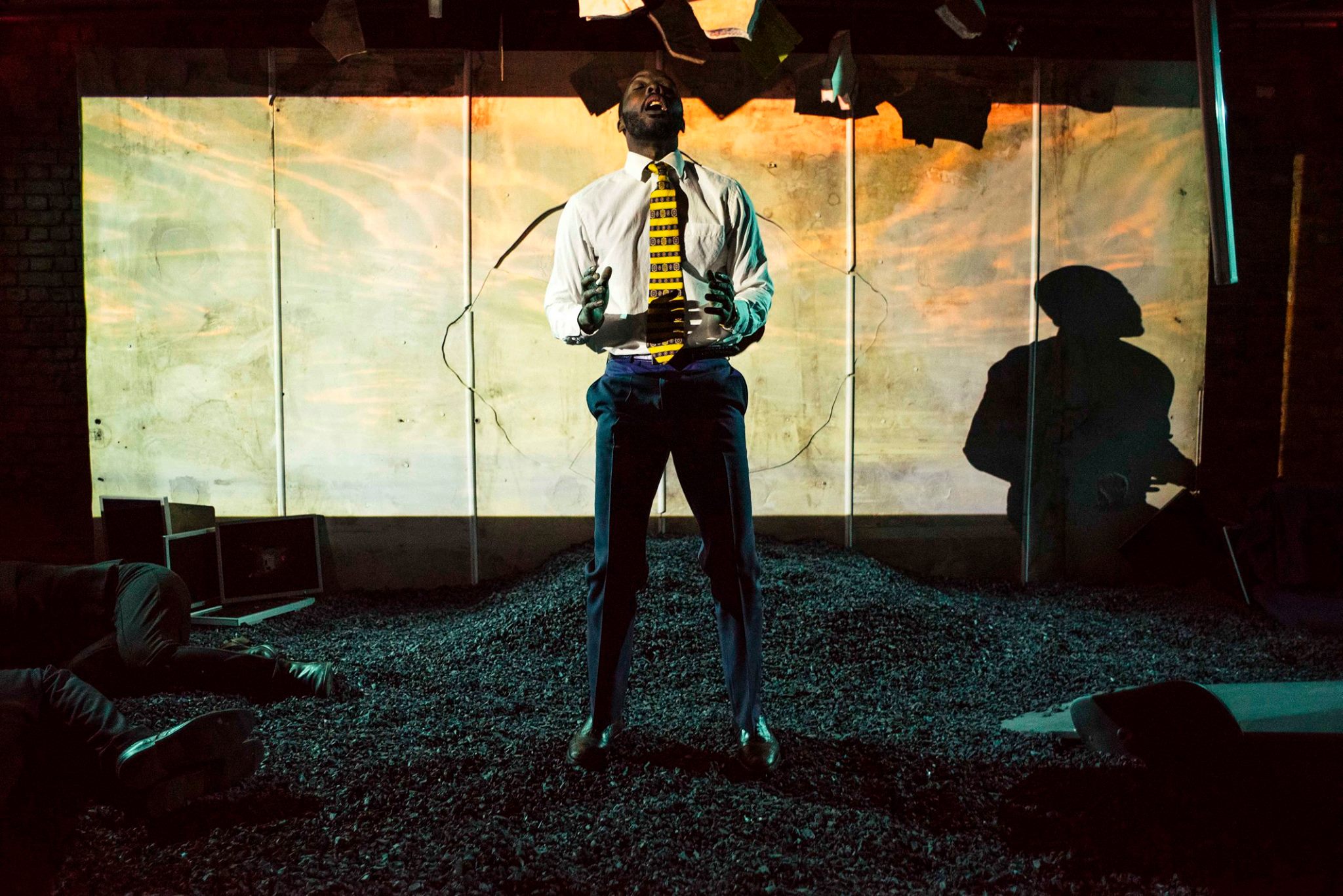
Solomon Israel in The Pulverised at the Arcola Theatre, May 2017
It was invaluable to have this time with the actors to a) ensure the text was actable, and b) continue to play around with and explore some of the choices available to me in terms of vocabulary and phrasing. It’s a highly creative and collaborative part of a process which, at times, is quite solitary. At some point the translator has to move away from the original text to ensure the piece exists independently and this workshop was instrumental in giving me the confidence to take bigger risks and make stronger creative decisions with the text, thus bringing me closer to my final draft ready for rehearsals.
The pinnacle of the process was, without a doubt, watching the brilliant Rebecca Boey, Kate Miles, Solomon Israel, and Richard Corgan perform The Pulverised at Arcola Theatre, London with Alexandra Badea present in the audience. My open dialogue with Alex throughout the process over email, Skype, and in person had been a very fruitful and important part of my journey. Including her regularly along the way in some of our creative decisions gave Andy and me a confidence that Alex would be happy with how her work was being translated to the UK stage.
The translator’s “place” in the creative theatrical process is still unclear. Their work can sometimes be a bit of a mystery to creatives and producers: I have a few colleagues who have experienced being excluded from the rehearsal room once they’ve handed over a script; kept out of the loop in terms of textual changes; and others not sent a card on the first night, press, or even after the run. These instances are rare, but it is a shame translators are not always given the same respect playwrights seem to receive. It shows a lack of understanding of the art and skill of translation. (No, we don’t just translate it word-for-word…)
In my view, for commercial reasons (and perhaps to minimise their risk), many theatres would rather work with an established playwright with little to no knowledge of the language and culture of the original text to produce an English language version of a foreign text, rather than a translator. My fear with this is that even if they are working from an excellent literal translation, he/she will not be able to get under the skin of the original piece in the same way as a translator who is armed with a cultural and linguistic knowledge of the country of origin of the piece.
I would also ask whether in using this method, we run the risk of some playwrights moving away from the original work in order to render ‘their version’ of the piece (and sometimes even removing all sense of “foreignness” completely). Is this still translation? Or is it now an adaptation? There are also a handful of lucky playwrights who have the dream combination of being a writer by trade and possessing foreign language abilities – Martin Crimp, for example – and long may their work continue!
I’m hopeful attitudes are beginning to change and will continue to do so as more theatres seek to include new exciting contemporary international work in their seasons and want to collaborate more frequently with translators. My suggestion would also be to invest in and nurture the abilities of the translator at the beginning of their careers – there are many young writers programs, but where are the equivalents for “young translators?”
The successes of such brilliant translators as Christopher Hampton, Sasha Dugdale and William Gregory in giving international drama an English voice in high profile venues such as The Royal Court, and in the West End is only helping to work towards a brighter future for the translator in the world of theatre, as a valued member of the creative team. For now, as a fledgling, at the beginning of my translation career, I will keep plugging away at this endlessly fascinating and rewarding craft, and hope to see myself alongside them one day.
This post was written by the author in their personal capacity.The opinions expressed in this article are the author’s own and do not reflect the view of The Theatre Times, their staff or collaborators.
This post was written by William Gregory.
The views expressed here belong to the author and do not necessarily reflect our views and opinions.

